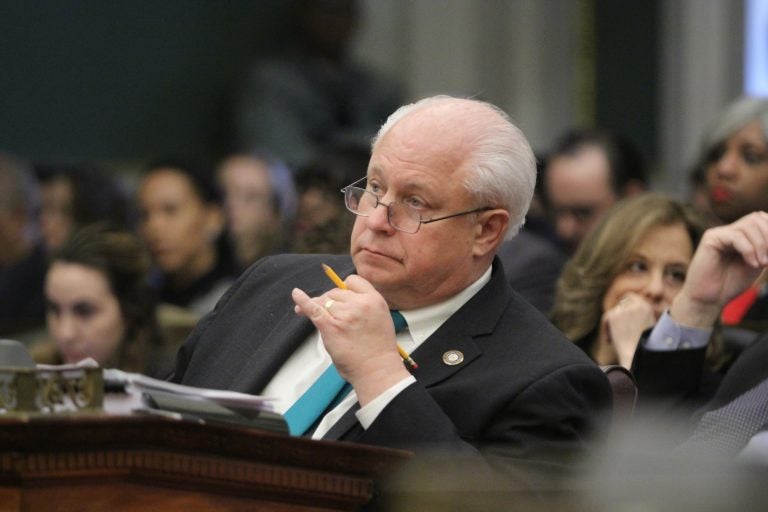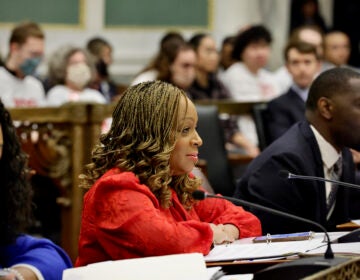Should grandma get a tax cut? One Republican city councilmember thinks so.
City Councilmember Al Taubenberger introduced a legislative package Thursday to give breaks on wage and real estate taxes to many Philadelphia families.

City Councilmember Al Taubenberger. (Emma Lee/WHYY)
City Councilmember Al Taubenberger introduced a legislative package Thursday to give breaks on wage and real estate taxes to many Philadelphia families.
The ambitious program comes as the at-large councilmember faces a difficult re-election bid in one of the city’s few competitive races this November.
“We live in economically challenging times, by and large wages have not kept pace with inflation,” Taubenberger said. “Today I’m introducing ordinances to give Philadelphians with children a meaningful break on their taxes.”
Taubenberger introduced four bills. One would provide a real estate tax credit of up to $3,800 annually for grandparents who serve as primary caretakers.
Another would offer equivalent relief from local property taxes to working grandparents. The third would offer similar support to parents whose kids are in daycare. The final bill would offer wage tax credit up to $3,800 for working parents.
Taubenberger’s spokesperson Frank Keel said that there is currently no estimate for how much these tax credits would cost the city. The legislation didn’t contain any details about how the loss of tax revenue would be addressed.
“It is our hope that, as these proposals gain traction, we can work closely with the Department of Revenue to arrive at reasonable projections of the cost to the city and how we can make up the lost tax revenue,” Keel said. “It’s important to remember that the city is operating at a surplus currently. At some point, we owe it to the citizens of Philadelphia to ease their tax burdens.”
There are no co-sponsors.
Without any support lined up, passing a package of tax cuts would be a political feat at this point in the session. The bill, however, is timed perfectly for Election Day.
“It is not uncommon for elected officials facing re-election to be more active on the legislative front the closer they get to an election,” said Larry Ceisler, a lobbyist, political consultant, and longtime observer of Philadelphia politics. “I don’t think Al is any different than anyone else when it comes to that.”
An unconventional Republican
Taubenberger denies the bill has anything to do with the election, but he is facing a tough re-election bid at the close of his first term in City Council.
The Northeast Philly native holds one of two at-large seats held for non-majority parties. In heavily Democratic Philadelphia, these positions have traditionally been held by Republicans.
This year, Taubenberger must win enough votes in November to beat Republican challengers — including the well-funded Dan Tinney — as well as candidates from the left-wing Working Families Party. Sherrie Cohen is running as an independent as well.
“You take a candidate like Tinney, who is first on the ballot on the Republican side, and has solid support from building trades, that has to make him a favorite,” Ceisler said. “Al has a two-hurdle contest, he has to hurdle the Republican field and the Working Families Party and the independents. It’s not easy for anyone in this city if you aren’t a Democrat.”
Taubenberger is far outside the mainstream of national, or even local, conservative politics. He frequently mentions that his families fled Nazi Germany, and does not buy into the nativist trends that dominate Donald Trump’s Republican Party. He told activists that he agreed with the idea that housing is a human right and is one of the only Councilmembers to voice support for the idea of making it easier to establish rooming houses.
In the Republican primary for at-large Council seats, he tied for second place behind Tinney.
Taubenberger said that his ambitious legislative package is meant to address the issues he hears most commonly from constituents.
“These four ordinances address financial inequalities that adversely affect our seniors and working families,” Taubenberger said. “I respectively request the support of my colleagues. Thank you very much, and in closing, children are priceless.”
WHYY is your source for fact-based, in-depth journalism and information. As a nonprofit organization, we rely on financial support from readers like you. Please give today.







